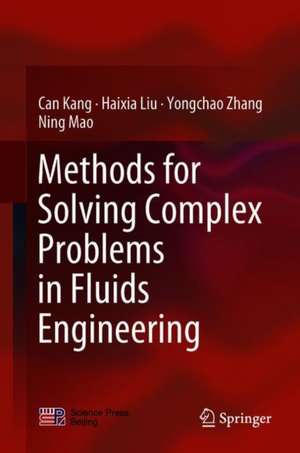Methods for Solving Complex Problems in Fluids Engineering
Autor Can Kang, Haixia Liu, Yongchao Zhang, Ning Maoen Limba Engleză Hardback – 24 ian 2019
The book also presents a number of practical cases, illustrating how the research methods covered can be concretely implemented. Lastly, the book offers a valuable point of departure for pursuing further research.
Preț: 643.84 lei
Preț vechi: 757.46 lei
-15% Nou
Puncte Express: 966
Preț estimativ în valută:
123.20€ • 128.97$ • 101.94£
123.20€ • 128.97$ • 101.94£
Carte tipărită la comandă
Livrare economică 05-19 aprilie
Preluare comenzi: 021 569.72.76
Specificații
ISBN-13: 9789811326486
ISBN-10: 9811326487
Pagini: 264
Ilustrații: XIII, 224 p. 155 illus., 149 illus. in color.
Dimensiuni: 155 x 235 mm
Greutate: 0.51 kg
Ediția:1st ed. 2019
Editura: Springer Nature Singapore
Colecția Springer
Locul publicării:Singapore, Singapore
ISBN-10: 9811326487
Pagini: 264
Ilustrații: XIII, 224 p. 155 illus., 149 illus. in color.
Dimensiuni: 155 x 235 mm
Greutate: 0.51 kg
Ediția:1st ed. 2019
Editura: Springer Nature Singapore
Colecția Springer
Locul publicării:Singapore, Singapore
Cuprins
Introduction to complex problems in fluid engineering.- A brief overview of research methods.- Submerged Waterjet.- Motion of Bubble.- Wake flow of the ventilation cylinder.- Drag-type hydraulic Rotor.- Viscous flows in the impeller pump.- Cavitation in the condensate pump.- Structural aspect of the impeller pump.
Notă biografică
Prof. Can Kang completed his Ph.D. in Fluid Machinery and Fluid Engineering in 2007 and is currently a Ph.D. supervisor at Jiangsu University. He is also a senior member of the Chinese Mechanical Engineering Society (CMES), and a member of the American Society of Mechanical Engineers (ASME) and International Association for Hydro-Environment Engineering (IAHR). His research covers impeller pumps, waterjets, cavitation and hydraulic rotors. He has published more than 100 academic papers and coauthored five books, and has received scientific and technological achievement awards from the Ministry of Education of the People’s Republic of China, Jiangsu Province of China, and the China Machinery Industry Federation. In 2016, he received the award of Outstanding Individual in Scientific and Technical Research in Chinese Machinery Industry.
Haixia Liu is a professor at the School of Material Science and Engineering, Jiangsu University of China. She has beenperforming extensive investigations on surface modification with cavitating technology since 2010. She has published 45 academic papers and co-authored one monograph, and is currently investigating cavitation erosion induced by ultrasonic cavitation and waterjet cavitation.
Yongchao Zhang is a Ph.D. candidate at the School of Energy and Power Engineering, Jiangsu University of China. His research interests include pumps applied in nuclear engineering, liquid metal flows and drag-type hydraulic rotors. He is currently performing studies using both experimental and numerical tools.
Ning Mao is a Ph.D. candidate at the School of Energy and Power Engineering, Jiangsu University of China. His research interests include bubble dynamics and cavitation visualization. He is currently using high-speed photography and in-house image-processing codes to obtain qualitative information on the bubbles involved in liquid flows.
Haixia Liu is a professor at the School of Material Science and Engineering, Jiangsu University of China. She has beenperforming extensive investigations on surface modification with cavitating technology since 2010. She has published 45 academic papers and co-authored one monograph, and is currently investigating cavitation erosion induced by ultrasonic cavitation and waterjet cavitation.
Yongchao Zhang is a Ph.D. candidate at the School of Energy and Power Engineering, Jiangsu University of China. His research interests include pumps applied in nuclear engineering, liquid metal flows and drag-type hydraulic rotors. He is currently performing studies using both experimental and numerical tools.
Ning Mao is a Ph.D. candidate at the School of Energy and Power Engineering, Jiangsu University of China. His research interests include bubble dynamics and cavitation visualization. He is currently using high-speed photography and in-house image-processing codes to obtain qualitative information on the bubbles involved in liquid flows.
Textul de pe ultima copertă
This book describes recently developed research methods used to study complex problems in fluid engineering, especially optical flow measurement, flow visualization and numerical methods. It includes a wealth of diagrams and images, and the content is presented in a step-by-step manner from beginning to end, helping readers grasp the central points of the book.
The book also presents a number of practical cases, illustrating how the research methods covered can be concretely implemented. Lastly, the book offers a valuable point of departure for pursuing further research.
The book also presents a number of practical cases, illustrating how the research methods covered can be concretely implemented. Lastly, the book offers a valuable point of departure for pursuing further research.
Caracteristici
Highlights essential flow mechanisms and research methods in fluid engineering Offers a comprehensive introduction to cutting-edge research methods in fluid engineering Validates the methods presented in practical cases
